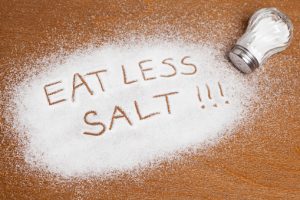
By now, you’re probably aware that salt is one of the heart’s biggest enemies. But do you know exactly how much salt it takes for problems to arise? Not much. In fact, a mere two teaspoons (3.73 grams) of salt is all it takes for blood pressure to rise, causing damage to the heart.
Advertisement
The latest findings on salt and the heart revealed that consuming two teaspoons of salt a day is enough to cause larger heart chambers. Previous studies uncovered that the heart becomes enlarged when it is being overworked as a result of a condition like high blood pressure.
Another effect salt has on the heart is that it causes it to beat more rapidly, causing strain.
But how does salt manage to cause so many changes to the heart? It’s because of how it affects blood pressure. Changes in blood pressure have also been linked to heart attacks, stroke, and kidney disease.
The recommended intake of salt by the CDC and NHS is less than a one-and-a-quarter teaspoon of salt daily. Unfortunately, for many of us, this number is easily exceeded as we don’t cook at home and often reach for processed or fast food.
Salt intake linked with heart damage
The study looked at heart outcomes of 2,996 individuals with an average age of 49. Sodium intake was measured through the participant’s urine samples. Participants also underwent ultrasounds of their hearts.
Average daily intake of salt was 33.73 grams, which contributed to enlarged heart chambers.
Advertisement
The rise in blood pressure as a result of consuming salt is due to salt’s ability to cause the body to retain water.
Tips to reduce salt in your diet
As you can see, consuming too much salt can have some dangerous consequences to your heart and overall health. Therefore, reducing your salt intake is a wise choice, especially if you’ve already been diagnosed with high blood pressure. Here are some tips to help you reduce your salt intake.
- Use fresh meat instead of packaged meat, which is often loaded with sodium.
- Choose fresh fruits and vegetables.
- When choosing frozen vegetables, choose packages labeled “fresh frozen” that do not contain sauces.
- Always read sodium levels on food labels.
- Select spices that do not contain sodium as an ingredient.
- Research restaurants prior to going out to eat or ask for no salt.
- Be cautious of products that don’t taste salty but actually are, such as cottage cheese.
- After six to eight weeks, your taste buds will be accustomed to eating foods with less salt.
For other tips, speak to your doctor or nutritionist to help further reduce your intake of salt.
